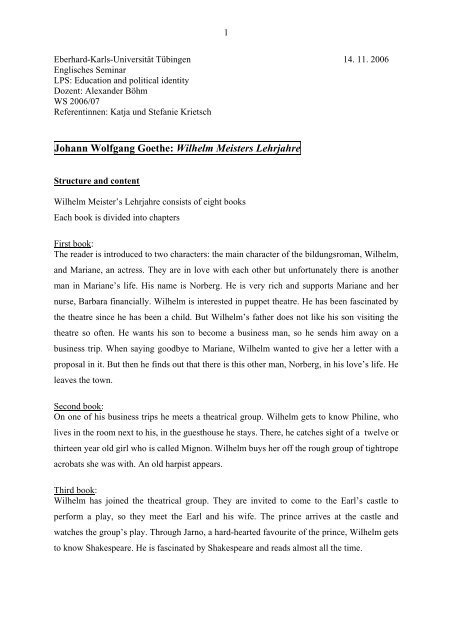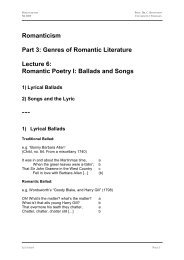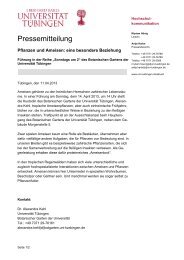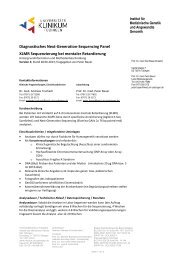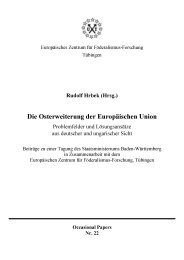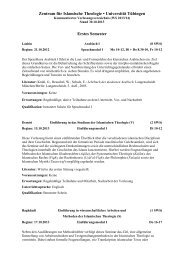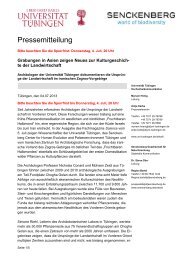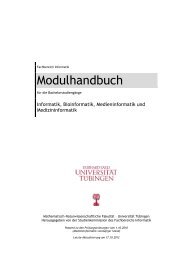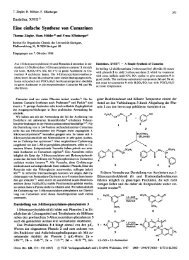Johann Wolfgang Goethe: Wilhelm Meisters Lehrjahre
Johann Wolfgang Goethe: Wilhelm Meisters Lehrjahre
Johann Wolfgang Goethe: Wilhelm Meisters Lehrjahre
Create successful ePaper yourself
Turn your PDF publications into a flip-book with our unique Google optimized e-Paper software.
Eberhard-Karls-Universität Tübingen 14. 11. 2006<br />
Englisches Seminar<br />
LPS: Education and political identity<br />
Dozent: Alexander Böhm<br />
WS 2006/07<br />
Referentinnen: Katja und Stefanie Krietsch<br />
<strong>Johann</strong> <strong>Wolfgang</strong> <strong>Goethe</strong>: <strong>Wilhelm</strong> <strong>Meisters</strong> <strong>Lehrjahre</strong><br />
Structure and content<br />
<strong>Wilhelm</strong> Meister’s <strong>Lehrjahre</strong> consists of eight books<br />
Each book is divided into chapters<br />
1<br />
First book:<br />
The reader is introduced to two characters: the main character of the bildungsroman, <strong>Wilhelm</strong>,<br />
and Mariane, an actress. They are in love with each other but unfortunately there is another<br />
man in Mariane’s life. His name is Norberg. He is very rich and supports Mariane and her<br />
nurse, Barbara financially. <strong>Wilhelm</strong> is interested in puppet theatre. He has been fascinated by<br />
the theatre since he has been a child. But <strong>Wilhelm</strong>’s father does not like his son visiting the<br />
theatre so often. He wants his son to become a business man, so he sends him away on a<br />
business trip. When saying goodbye to Mariane, <strong>Wilhelm</strong> wanted to give her a letter with a<br />
proposal in it. But then he finds out that there is this other man, Norberg, in his love’s life. He<br />
leaves the town.<br />
Second book:<br />
On one of his business trips he meets a theatrical group. <strong>Wilhelm</strong> gets to know Philine, who<br />
lives in the room next to his, in the guesthouse he stays. There, he catches sight of a twelve or<br />
thirteen year old girl who is called Mignon. <strong>Wilhelm</strong> buys her off the rough group of tightrope<br />
acrobats she was with. An old harpist appears.<br />
Third book:<br />
<strong>Wilhelm</strong> has joined the theatrical group. They are invited to come to the Earl’s castle to<br />
perform a play, so they meet the Earl and his wife. The prince arrives at the castle and<br />
watches the group’s play. Through Jarno, a hard-hearted favourite of the prince, <strong>Wilhelm</strong> gets<br />
to know Shakespeare. He is fascinated by Shakespeare and reads almost all the time.
2<br />
Fourth book:<br />
The group leaves the castle and moves on. <strong>Wilhelm</strong> has become their leader. On their way<br />
they are attacked and plundered. <strong>Wilhelm</strong> is wounded by a shot. A beautiful Amazon (die<br />
„schöne Amazone“) and her companions (an „alter Herr“ and a „Wundarzt“) come by but<br />
<strong>Wilhelm</strong> faints and when he wakes up again the beautiful woman is not there anymore.<br />
<strong>Wilhelm</strong>, Mignon, the harpist and Philine have come through the attack and arrive at their<br />
emergency accomodation where they can stay. There, they meet the others again. The group is<br />
angry because they were attacked and they express their annoyance about <strong>Wilhelm</strong> being their<br />
leader. Only Mignon and the harpist remain with <strong>Wilhelm</strong>. They move on and <strong>Wilhelm</strong><br />
constantly thinks of the beautiful Amazon. Then they meet Serlo, a theatre manager and<br />
<strong>Wilhelm</strong>’s friend. Serlo introduces them to his sister Aurelie, who is an actress. Philine<br />
spreads gossip about Aurelie having a love affair and being the mother of a three year old<br />
boy, Felix. Philine reveals her love to <strong>Wilhelm</strong>.<br />
Fifth book:<br />
<strong>Wilhelm</strong> is successful with his performance of the play ‘Hamlet’. The theatre is burned down.<br />
<strong>Wilhelm</strong> suspects that the harpist is insane and takes him to a priest because he thinks that the<br />
harpist started the fire since he wanted to sacrifice Felix. Aurelie tells <strong>Wilhelm</strong> that she is ill.<br />
A doctor visits her and he gives his friends a book, called „Bekenntnisse einer schönen<br />
Seele“. Aurelie gives <strong>Wilhelm</strong> the task of delivering a letter to Lothar. She dies.<br />
Sixth book:<br />
The content of „Bekenntnisse einer schönen Seele“ is described in the sixth book of <strong>Wilhelm</strong><br />
<strong>Meisters</strong> <strong>Lehrjahre</strong>. One of Lothar’s aunts describes her religious life. Incidentally, the family<br />
background becomes obvious: Lothario has a sister who is called Natalie.<br />
Seventh book:<br />
<strong>Wilhelm</strong> is on his way to Lothario with Aurelie’s letter. <strong>Wilhelm</strong> departs from the theatre<br />
more and more, the actors do not follow his instructions anymore and his passion for the<br />
theatre comes to an end. <strong>Wilhelm</strong> arrives at Lothario’s castle. Lothario is wounded and his<br />
lover Lydie is always near him which does not help his recovery. Therefore, she is send to a<br />
distant town and <strong>Wilhelm</strong> is supposed to be her companion. They travel to Therese. When<br />
<strong>Wilhelm</strong> comes back to Lothario’a castle he is allowed to send for the children Mignon and<br />
Felix. He realizes that the old woman, who looked after the children, is Barabara, Mariane’s<br />
former nurse. She tells him the truth about Mariane and Felix. <strong>Wilhelm</strong> gets to know that<br />
Felix is his son and that Mariane died after Felix’ birth.
3<br />
Eighth book:<br />
Mignon’s secret is revealed: She is the harpist’s daughter. The harpist, who is called<br />
Augustin, loved a girl named Sperata when he was young. When Sperata was pregnant, they<br />
discovered that they were brother and sister. The couple was seperated and their child,<br />
Mignon, was taken away from them. <strong>Wilhelm</strong> asks for Therese’s hand in marriage who is also<br />
Lothario’s beloved. But then <strong>Wilhelm</strong> meets the Amazon again. It is Natalie, Lothario’s sister.<br />
Mignon dies. At the end Lothario and Therese marry and <strong>Wilhelm</strong> marries Natalie.<br />
Characters<br />
<strong>Wilhelm</strong>: main character; loves Mariane, but leaves her; father of Felix<br />
Mariane: loves <strong>Wilhelm</strong>; Felix’ mother<br />
Felix: Mariane’s and <strong>Wilhelm</strong>’s son<br />
Mignon: daughter of Sperata and the harpist Augustin; <strong>Wilhelm</strong> buys her off a<br />
rough group of tightrope acrobats; dies in the end<br />
Natalie: beautiful Amazon; Lothario’s sister; marries <strong>Wilhelm</strong> in the end<br />
Lothario: marries Therese; Natalie’s brother<br />
The harpist (Augustin): Marchese Cipriani’s brother; Mignon’s father<br />
Aurelie: Serlo’s sister<br />
Barbara: Mariane’s nurse<br />
Lydie: Lothario’s lover; Lothario does not want her anymore<br />
Marchese Cipriani: Mignon’s uncle<br />
Norberg: Mariane’s lover<br />
Philine: actress; loves <strong>Wilhelm</strong><br />
Serlo: theatre manager; <strong>Wilhelm</strong>’s friend<br />
Sperata: the harpist’s sister; Mignon’s mother<br />
Therese: marries Lothario in the end<br />
The character of Mignon<br />
,,Seine Augen und sein Herz wurden unwiderstehlich von dem geheimnisvollen Zustand dieses<br />
Wesens angezogen. Er schätzte sie zwölf bis dreizehn Jahre alt, ihr Körper war gut gebaut,<br />
nur dass ihre Glieder einen stärkern Wuchs versprachen oder einen zurückgehaltenen<br />
ankündigten. Ihre Bildung war nicht regelmäßig, aber auffallend; ihre Stirne geheimnisvoll,<br />
ihre Nase außerordentlich schön, und der Mund [...] noch immer treuherzig und reizend<br />
genug“ (Seite 99, Zeile 4-14).
4<br />
- this is what <strong>Wilhelm</strong> Meister thinks when he sees Mignon for the very first time<br />
- is not mentioned too often, but nevertheless she is omnipresent<br />
� <strong>Goethe</strong> said once that he only wrote <strong>Wilhelm</strong> <strong>Meisters</strong> <strong>Lehrjahre</strong> because of Mignon<br />
- because of her mysterious figure, <strong>Wilhelm</strong> first cannot decide if Mignon is a boy or a girl<br />
- but this is also what attracts him: her androgynous appearance<br />
- she is physically underdeveloped because of the circumstances of her childhood<br />
- when she is asked for her name she says: ,,Sie heißen mich Mignon”(Seite 98, Zeile 32).<br />
- never says ‘I am’ (Ich bin)<br />
- not only her appearance is mysterious but also her name: in this time male lovers of<br />
princes in France were called Mignon<br />
� this name also shows her sexual neutrality<br />
- when the story-teller talks about Mignon he often uses the words<br />
,,Wesen, Gestalt and Kreatur”<br />
- Mignon has great problems with the German language and so she often prefers to sing and<br />
not to talk<br />
- after <strong>Wilhelm</strong> has bought Mignon off the tightrope acrobates she devotes herself to serve<br />
<strong>Wilhelm</strong><br />
- Mignon wants to be dressed like <strong>Wilhelm</strong>, she identifies with him and this goes along<br />
with the development of her passion for him<br />
Mignon’s and <strong>Wilhelm</strong>’s relationship<br />
- there are three events which have a forming effect on Mignon’s life while she is with<br />
<strong>Wilhelm</strong><br />
- the first event takes place when Mignon waits for <strong>Wilhelm</strong> to come home one night and<br />
presents the so-called “Eiertanz”<br />
- with the help of music and dance Mignon expresses her feelings which she cannot do with<br />
words, therefore the moment of the Eiertanz is one of extreme vulnerability<br />
- she submits to <strong>Wilhelm</strong> and looks at him as her master<br />
- as a countermove to this, he strokes her and she feels sheltered by him<br />
- what she does not know is that she is also the object of his desire for love<br />
- <strong>Wilhelm</strong> gives Mignon warmth and security, which she longs for so much<br />
� for her <strong>Wilhelm</strong> embodies father, protector and lover (but at the end of the novel the<br />
reader gets to know that <strong>Wilhelm</strong> fails concerning all three roles)
5<br />
,,Wenn sie kam oder ging, guten Morgen oder gute Nacht sagte, schloß sie ihn so fest in ihre<br />
Arme und küsste ihn mit solcher Inbrunst, dass ihm die Heftigkeit dieser aufkeimenden Natur<br />
oft Angst und bange machte“ (Seite 272, Zeile 8-12).<br />
- the second drastic event for Mignon is after the presentation of Hamlet when <strong>Wilhelm</strong><br />
spends the night with a beauty<br />
,, ,Erinnern Sie sich’, sagte der Arzt, ,eines geheimen, nächtlichen, weiblichen Besuchs nach<br />
der Aufführung des Hamlets?’<br />
,Ja, ich erinnere mich dessen wohl!’ rief <strong>Wilhelm</strong> beschämt, ,aber ich glaubte nicht, in<br />
diesem Augenblick daran erinnert zu werden.’<br />
,Wissen Sie, wer es war?’<br />
,Nein! Sie erschrecken mich um Himmels Willen, doch nicht Mignon? wer war’s? Sagen Sie<br />
mir’s!’<br />
,Ich weiß es selbst nicht.’<br />
,Also nicht Mignon?’<br />
,Nein, gewiss nicht! aber Mignon war im Begriff, sich zu Ihnen zu schleichen, und musste aus<br />
einem Winkel mit Entsetzen sehen, dass eine Nebenbuhlerin ihr zuvorkam.’ (Seite 548,<br />
Zeile18-31)“<br />
- Mignon is no child anymore, she has become a woman, and what she discovers in that<br />
night means a breach of confidence for her<br />
- she considers this as a betrayal of her extensive love she feels for him<br />
- Mignon is always at <strong>Wilhelm</strong>’s side and when the group is attacked and <strong>Wilhelm</strong> is<br />
injured she wants to help him<br />
- but nevertheless it seems as if <strong>Wilhelm</strong> is just interested in other women which really<br />
hurts Mignon deeply<br />
- she feels replaced by Philine and Natalie, and even the role as a child is not hers anymore<br />
� Felix is the child now � there is a fight between Mignon and Felix<br />
- therefore she becomes estranged from <strong>Wilhelm</strong> (he never sees her as a woman)<br />
- the third and last event is another breach of confidence Mignon experiences and that<br />
probably leads to her death<br />
- this event is <strong>Wilhelm</strong>’s proposal of marriage to Therese which finally breaks his devotion<br />
he vowed when he adopted Mignon
6<br />
The solution of the secret<br />
- shortly before her death Mignon plays an angel which has the character of final answers to<br />
all secrets throughout the story (and she finally wears women’s clothes which she has<br />
never done before) � everything becomes clear at the end<br />
- but her secret only becomes clear after her death: Mignon is the daughter of the harpist<br />
(who has become a friend of hers) and his sister � because of this forbidden relationship<br />
the parents had to give Mignon away<br />
Mignon’s function in the novel<br />
- she is at <strong>Wilhelm</strong>’s side in every decisive and emotional moment, always helps him in<br />
difficult situations (� Mignon as refugee for Wilhem and not the other way round)<br />
- because she influences <strong>Wilhelm</strong>’s development she is structurally very important<br />
Mignon as a part of the bildungsroman<br />
- besides <strong>Wilhelm</strong>, Mignon is a prime example of a character in a bildungsroman<br />
- at the beginning of the novel everything concerning Mignon remains mysterious: her<br />
appearance, her character and her past<br />
- throughout the book the reader gets to know more and more about her and at the end her<br />
secret becomes clear to everyone<br />
- as a round character Mignon develops within the story<br />
- furthermore her development can be described as: from abstruseness to clarity, because of<br />
the mysterious beginning and the solution at the end when she dies<br />
bibliography<br />
<strong>Goethe</strong>, <strong>Johann</strong> <strong>Wolfgang</strong>. 1982. <strong>Wilhelm</strong> <strong>Meisters</strong> <strong>Lehrjahre</strong>. Stuttgart: Philipp Reclam jun.<br />
GmbH & Co.<br />
Hass, Hans-Egon. 1963. “<strong>Goethe</strong> – <strong>Wilhelm</strong> <strong>Meisters</strong> <strong>Lehrjahre</strong>.” In: Benno von Wiese, ed.<br />
Der deutsche Roman. Düsseldorf: August Bagel Verlag.<br />
Mahlendorf, Ursula. 1994. “The Mystery of Mignon: Object Relations, Abandonment, Child<br />
Abuse and Narrative Structure.” In: Thomas P. Saine, Ellis Dye, eds. <strong>Goethe</strong> Year book.<br />
Columbia: Camden House.<br />
Jirku Brigitte E. 2000. “Mignon: Rätsel oder Geheimnis.” Monatshefte für deutschsprachige<br />
Literatur und Kultur. Madison: University of Wisconsin Press. 283-301.


